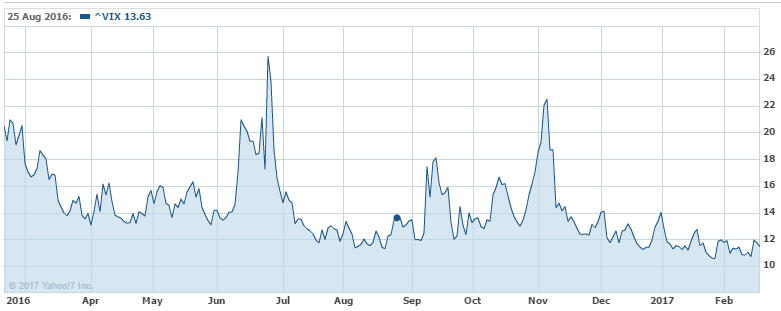Episodic bouts of equity market volatility in 2017 could presage a market crisis in 2018, and much hinges on the macro response of global economies in what will be a very interesting year.
The US is the wildcard in the global market outlook for the year, but market volatility in 2017 will likely be irregular rather than prolonged. However, the levels of asset price distortion in the market are expected to rectify during the year and this could be the forerunner of a sharp downturn and increased average volatility in 2018.
Recent volatility levels
Despite market commentators talking about high levels of volatility in the past year, it actually was not a very volatile year when the movements in the Chicago Board Options Exchange (CBOE) Volatility Index (VIX) are considered.
The VIX Index, also called the Fear Index, measures expected volatility on the S&P500 Index over the next 30 days. If investors expect that the market will move sharply (either up or down), the VIX will give a high reading.
The 20-year average of the VIX registers at just shy of 20, although it has moved as low as 10 and as high as 85. Although the VIX had the occasional rally in the past year it started from a very low base. There were a few volatility spikes during the year but no ongoing activity.
With 20 considered to be the baseline for volatility, the VIX was actually below this baseline 83% of the time in 2016, as shown below. In fact, the past three years have been incredibly non-volatile from an historical point of view.
Volatility Index (VIX) in last 12 months

Source: Yahoo! Finance
This may surprise investors who read headlines on market gyrations and assume markets have been volatile. But many of those movements are just little blips on the chart. When you are living it, those blips feel large, but historically they’re not.
In fact, the years since the Greek crisis, from 2012 onwards, occupy some of the calmest periods in the VIX’s history since 1990.
Drivers in 2017 and the overvaluation of assets
We expect this trend will continue into 2017, but there will be some key drivers of episodic market volatility to watch out for.
Policy uncertainty is a big driver of volatility, and with the election of President Trump, world markets have plenty of that. The second driver, closely related, will be the movement in the US dollar. The third will be oil and commodity prices, which are intermittently linked to the movement in the dollar. The fourth will be interest rates and the speed in which the US Federal Reserve (the Fed) undertakes interest rate hikes.
Economic growth is starting to happen in countries where it hasn’t occurred in recent times. We are already seeing green shoots of inflation - even in Europe - in the most recent data. We are certainly expecting inflation in the US, and President Trump pump-priming the economy will also impact inflation.
The Fed is considered by many to be behind the curve in this regard, and its reaction may be to raise rates higher and faster than the market anticipates. This will have a negative flow on effect because of the overvaluation of many assets globally. Many housing markets around the world are overvalued, along with equity markets, as well as the asset classes that have been pumped up for the past five years.
If rates surprise on the upside – and President Trump’s policies feed into that – a market downturn is inevitable for 2018.
A depressed US market is bad news for global economies. Stocks globally are priced at fairly high levels, and a rapid rise in rates could see a lot of that come undone. If the $US continues to rally, that is also not good for emerging markets, because their debt is denominated in dollars and so in local currency terms their obligations increase.
Opportunities for investors
This expected volatility, whether episodic or prolonged, creates opportunities for investors.
Investors should consider using options over the VIX to prepare for these bouts of volatility ahead of a potential market downturn in 2018.
Although most investors see volatility as simply a measure of risk, it is also an asset class in and of itself. An investment in volatility can be accessed through VIX options, which have been one of the fastest growing option markets in recent years. Volatility is usually negatively correlated to equity markets, so that when equity markets fall, volatility tends to rise, and vice versa. Investing in options on the VIX Index allows investors to access this negative correlation to the S&P500 which cannot be as reliably harnessed in other asset classes.
Although the VIX is a measure of the US, and not the Australian, equity market it is still a useful diversification tool for domestic holdings. Australian and US markets are highly correlated, and particularly so in periods where markets are falling. VIX options now rank up with the world’s most liquid, and have been known to trade over 1 million option contracts per day.
Generally speaking, people want to own equities because over the long run they do well. Allocating a portion of the portfolio to a volatility strategy can help to mitigate or circumvent the losses that come when the markets go down.
Simon Ho is Chief Investment Officer of Triple3 Partners. This article is general information and does not consider the circumstances of any investor.